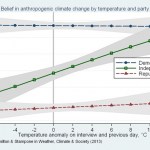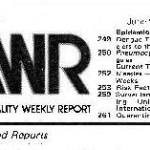I am slowly working my way through the anthology Circles Disturbed: The Interplay of Mathematics and Narrative, edited by Apostolos Doxiadis and Barry Mazur. The book includes an excellent essay by mathematician Timothy Gowers titled, “Vividness in Mathematics and Narrative.” It makes a point that has often bothered me about mathematical discourse.
Gowers opens with two passages meant to describe the beginning of an academic year. Here's the first:
It is September again, and the campus, which has been very quiet for the last couple of months, is suddenly full of cars bringing students…
Social Sciences
Those of us who dedicate considerable time and effort to combatting quackery generally do it because we think we're doing good. Certainly, I wouldn't spend so much time nearly every evening blogging the way I do if I didn't think so. It's true that I also enjoy it, but if I were doing this just for enjoyment I'm sure I could manage to find other topics that I could write about. In actuality, way back in deepest darkest beginnings of this blog, I did write about a lot of other things. My skeptical topics were more general in nature, encompassing not just medicine but evolution versus "…
So here's the rather strange story.
Way back in 2010, librarian Dale Askey, then of Kansas State University, wrote a blog post critical of the humanities monograph publisher Edwin Mellen. Basically, he stated that the publishers' low quality did not justify their high prices. No big deal, really, librarians have lots of opinions about publishers and share them all the time around the water cooler, at conferences and online. But perhaps foreshadowing what was coming, Askey remarked in his post: "Given how closely Mellen guards its reputation against all critics, perhaps I should just put on my…
Some of you may have seen this when it came out, but I was busy and missed it, and it bears repeating, because we so often think that caregiving is a product of modern capacity. From the New York Times:
Almost all the other skeletons at the site, south of Hanoi and about 15 miles from the coast, lie straight. Burial 9, as both the remains and the once living person are known, was laid to rest curled in the fetal position. When Ms. Tilley, a graduate student in archaeology, and Dr. Oxenham, a professor, excavated and examined the skeleton in 2007 it became clear why. His fused vertebrae…
Are we facing Snowpocalypse this weekend? Rest assured, your blogiste is ready. Ok, sorta ready, since I'm working on my book I have to rely on husband, Phil-the-housemate and children to move a buttload of wood inside, and we do have to pick up more baby formula, but otherwise, we're ready to hunker down here and toast marshmallows while the world undergoes...what exactly?
Current forecasts place the total amount somewhere between 2.6 and 29.3 inches.
Such is the maddening, exhilarating unpredictability of weather patterns on this rock-and-lava spinning blueberry we call home…
It seems that people "believe" in climate change (really, global warming in particular) when it it hot out more than at other times. And by "people" I mean the population in general. It turns out that Democrats don't change their position on climate change as the temperature outside changes (they already know it is real) and Republicans do a little (because it is true and a small number of them will put reality before politics). Meanwhile, those darn Independent voters who have somehow taken over our democracy for some very poor reasons (IMHO) wildly change their beliefs literally on the…
From the NCSE:
The Next Generation Science Standards represent a tremendous opportunity to strengthen science education in the United States, but also a tremendous risk.
Dozens of states have signed up to consider replacing their existing standards with these new ones. NGSS could revolutionize the US science curriculum, doing great good if they live up to their promise: if evolution and climate change are covered accurately, if they are integrated throughout the curriculum and across grade levels, if the nature of science is presented honestly and incorporated throughout the curriculum, and…
by Kim Krisberg
When it comes to good health, America is far from top dog.
Yes, we may spend the most, we may have some of the most advanced medical technologies and we may produce some of the best doctors. But when it comes to the ultimate measure of a health care system's success — the health of people and populations — it seems we are losing a winnable battle.
"There's hardly anything more consequential than Americans dying earlier and being sicker," Dr. Steven Woolf, chair of the Institute of Medicine's and National Research Council's Panel on Understanding Cross-National Health…
Michael Mann is one of the key climate scientists of the day. History will crown Mann as one of the great heroes who defended the freedom to do science rationally despite constant attacks from mean spirited and ignorant, self interested, politically motivated, oil-money-soaked climate science denialists. You know of Michael Mann as the coiner of the term "hockey stick" to refer to the alarming uptick in temperature and related measures connected to the human caused release of copious quantities of fossil Carbon into the Earth's atmosphere, causing one of the greatest disasters this planet…
by Kim Krisberg
Dr. Paul Demers says he frequently finds himself having to make the case for why studying workplace exposures to carcinogens is important. Oftentimes, he says, people believe such occupational dangers are a thing of the past.
"A lot of people are still developing cancer and dying from cancer due to workplace exposures, but only a small fraction of those are compensated, so people may think the magnitude of this problem is small," said Demers, director of the Occupational Cancer Research Centre in Ontario, Canada. "I wanted to have better data."
And in just a few years, he will…
As part of their ongoing campaign to botch as many personnel decisions as possible, the Obama administration recently announced that the Reverend Louie Giglio, of Atlanta, would deliver the benediction at the forthcoming inaugural. They rescinded the invitation, however, when an anti-gay sermon preached by Giglio many years ago came to light. The administration should have thought to look for such things before inviting him, but at least they belatedly did the right thing.
Some of the mopier denizens of the religious right are less pleased, however. This article, over at HuffPo, rounds up…
Ferdinand Balfoort contributes a guest entry upon a recent ancestral pilgrimage to Stockholm.
I gladly agreed to write something for the blog after being introduced by Martin to a book by Frans G. Bengtsson about Early Modern Scottish brigades (and brigadiers) in the Nordic region including Sweden. I visited Stockholm in December on my quest to find my 16th century ancestor Gilbert Balfour who lost his head during a public decapitation procedure with a sharp implement, somewhere in the Old Town. So far I am no closer to retrieving his head or his grave site, but some illumination has been…
We shall not be moved. ..."
Fifty five of us jammed in a bus designed to hold fourty people plus a driver, rolling down Highway 90 from Upstate New York to Chicago. As a teenager (just turned 15), I was thrilled to be going to Chicago to attend the Fight Back Conference, a thinly disguised Communist Party meeting. I was going, in part for Keith, the young African American kid (about 12 years old) who was shot in the back by a state trooper just under a year earlier. Keith was driving a mo-ped down the toll road, on the shoulder, where he shouldn't have been. It appears that he did not…
In this post, from last year, I mentioned that I regard Victor Hugo's Les Miserables as the finest novel ever written. I also think the musical version actually captures the spirit of the novel pretty well, far better than any of the non-musical film adaptations that have appeared over the years.
You can imagine, then, my excitement at the release of the movie version of the musical. I saw it last week. Short review: Good enough that I plan on seeing it again in the theater, but not quite the knock-your-scoks-off excellent that I wanted.
There are two big weaknesses that are hard to…
By Rebecca Kreston
“Pneumocystis Pneumonia --- Los Angeles,” in the June 5, 1981 edition of the CDC’s Morbidity and Mortality Weekly Report, was an economical seven paragraph clinical report cataloging five observed cases, accompanied by an explanatory editorial note on the rarity of this fungal disease. It seemed to be nothing out of the ordinary from MMWR, a publication that has been issuing the latest epidemiology news and data from around the world for 60 years. The report was included in that week’s slim 16 page report detailing dengue in American travelers visiting the Caribbean,…
I started following Chris Stedman on Twitter thanks to a recommendation from Josh Rosenau citing him as someone who promotes atheism without being contemptous of religious people. He was, indeed, a source of religion-and-politics material that I found congenial, and when I noticed he was flogging a forthcoming book, I picked up a copy, which I just got around to reading.
I'm a little hesitant to review this at all here on ScienceBlogs, given past history. I've pretty much completely withdrawn from culture-war blogging, finding it more aggravating than useful, and these days just about the…
The evidence from palaeoanthropology suggests that in the past humans were about the stature they are now, with more sexual dimporphism than now, with similar or larger brains than they have now, and used technology at the same level of sophistication as many later humans. Scientists argue over the degree to which modern day language abilities, symbolic thinking, and artistic capacity was found in these earlier humans.
Where we see physical evidence suggesting morbidity or even mortality among those humans, which included "archaic Homo sapiens" and Neanderthals and their kin, we often see…
From campaignforrealfarming.org, via IR. Inspired by KK, of course. I don't know who the campaignforrealfarming are, but for the moment I'll treat them as worth talking to. You'll notice there is a total absence of refs in the piece, so I feel no obligation to provide any in response.
The first three questions
The first three questions are:
1: After 30 years of intense effort and huge investment, can the GM advocates offer any examples of GM food crops that have brought unequivocal benefit to humanity or to the world at large?
2: Assuming that the advocates of GM food can demonstrate…
While it has not generally been my practice to do year end review posts, artificially trying to tie the various and disparate strands of my blogging habits together into some sort of coherent story, I think for this year it's worth doing. And that's because my blogging year did seem to have a coherent theme -- advocating for a fairer and more just scholarly publishing ecosystem.
In particular I spent an awful lot of time advocating for Open Access in one way, shape or form. Not that I haven't always done so, but with all the various events happening in the academic and library worlds this…
I certainly don't even try to keep secret my opinion of Andrew Wakefield, the British gastroenterologist who is almost single-handedly responsible for bringing the measles back to the UK, thanks to his bad science, for which he was well-paid by trial lawyers and his falsification of data and scientific fraud. Since 1998, when Wakefield first published his fraudulent (and now retracted) little case series in The Lancet, his work and his personality have dominated the antivaccine movement in the UK. After he moved to Texas to ply his antivaccine quackery here in the US, he soon became a…



